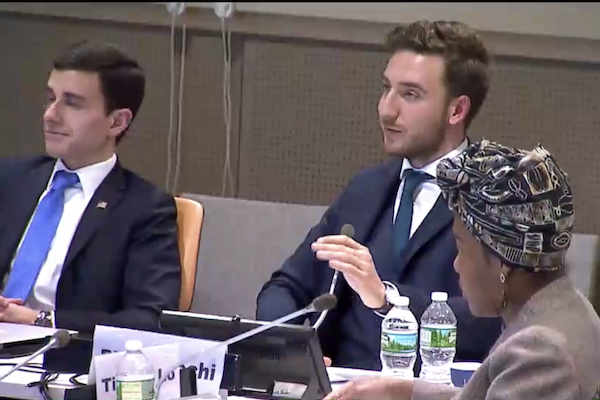The adoption of the 2030 Agenda for Sustainable Development offers a unique opportunity to foster investment and collaboration on youth entrepreneurship. In particular SDG 8 and a series of aspirational targets recognize today’s employment challenge. For sustainable development to be realized, economic, social and environmental development are the integrated building blocks needed to lift the world out of poverty and thrust it into a shared prosperity for people and planet. It is therefore important to discuss how through economic opportunity and investment in youth, we can find innovative solutions for addressing inequalities through youth entrepreneurship.
The world’s youth population is at an all-time high, with 1.8 billion people aged 15 to 29. With 87% of the world’s youth living in developing countries, persistent unemployment among young people remains a problem, and youth entrepreneurship can play an important part in facilitating job creation. Around the world, entrepreneurship and small and medium-sized enterprise creation constitute sources of sustainable economic growth, driving innovation and structural changes in the economy while contributing to job creation and increased productivity.
While young people often turn to self-employment because they cannot find jobs elsewhere, entrepreneurship can provide them with valuable skills such as critical thinking, decision-making, leadership, teamwork and innovation. As young people increasingly face difficulties to enter the labour market, governments are moving towards the promotion of youth entrepreneurship and the creation of internship programmes for young people to acquire marketable skills. Likewise, many young people themselves, disillusioned with employment prospects, turn to starting their own enterprise.
Information and communications technology (ICT), in particular Internet-based social media platforms, have collectively become the principal arena for youth political and social engagement over the past decade. These online environments can also contribute to the development of youth entrepreneurship.
Entrepreneurship can make an important contribution to sustainable development by creating jobs and driving economic growth and innovation, improving social conditions and addressing inequalities. With the present concurrence of globalization, technological innovation and demographic trends, much greater attention is being focused on the role and potential impact of entrepreneurship.
Entrepreneurs, in particular young entrepreneurs, are by definition innovators, visionaries and risk takers. However, there are three key issues that need to be considered:
- Skills development;
- Access to information, know-how, technical assistance and coaching;
- Access to adequate financial services.
Failing to address any of these issues may significantly restrict the successful implementation of youth entrepreneurship projects.
Sustainable development relies on the participation of all stakeholders at all levels. Such participation requires involving young potential entrepreneurs from a project’s inception and design phase through its implementation. Only through a participatory process can one fully comprehend the issues affecting young people and identify solutions that are both viable and sustainable. Partnerships with youth and the private sector, such as financial institutions are instrumental to boosting the creation of youth enterprises. Young female entrepreneurs may need safe spaces for meetings or specific socially acceptable methods of entering the economic system in some cultures.
UNDESA’s Division for Inclusive Social Development (DISD), will organize a high-level meeting on Youth Entrepreneurship during the 57th session of the Commission for Social Development (CSocD57) on 20 February 2019 at UN Headquarters in New York.
The event will examine the development and challenges of entrepreneurship, with a special focus on youth.
The aim is to:
- Identify ways to support and sustain youth entrepreneurship;
- Engage Member States, United Nations system entities, private sector, civil society and other relevant stakeholders to support youth entrepreneurs especially in developing countries;
- Showcase examples of youth entrepreneurs;
- Support the exchange of ideas on how youth enterprises with a strong social foundation can accelerate the implementation of the 2030 Agenda for Sustainable Development and the SDGs.
Original intervention on EDUACTIVE
